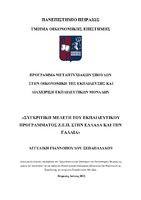Συγκριτική μελέτη του εκπαιδευτικού προγράμματος Ζ.Ε.Π. στην Ελλάδα και την Γαλλία

Master Thesis
Συγγραφέας
Γιαννοπούλου - Ξεπαπαδάκου, Αγγελική
Ημερομηνία
2022-07Επιβλέπων
Ιωακειμίδη, ΜαριλούΠροβολή/
Λέξεις κλειδιά
Σχολική διαρροή ; Ζώνες εκπαιδευτικής προτεραιότητας ; Αντισταθμιστική εκπαιδευτική πολιτικήΠερίληψη
Στην Ευρωπαϊκή Ένωση ένα σημαντικό ποσοστό παιδιών ηλικίας δεκαεπτά ετών εγκαταλείπει το σχολείο χωρίς να αποκτήσει απολυτήριο δευτεροβάθμιας εκπαίδευσης. Η σχολική αποτυχία και κατ’ επέκταση σχολική διαρροή αποτελεί ένα δυσεπίλυτο πρόβλημα για την Ελλάδα αλλά και για τα υπόλοιπα ευρωπαϊκά κράτη, που πρέπει να αντιμετωπιστεί. Η αναγνώριση αυτής της ανάγκης οδήγησε τους ερευνητές στην αναγνώριση των γενεσιουργών παραγόντων, στην παρουσίαση προτάσεων για την διαμόρφωση κατάλληλων συνθηκών εκπαιδευτικής πολιτικής και στην εύρεση λύσεων για την κατοχύρωση της εκπαιδευτικής ισότητας. Αναδείχτηκε ο καθοριστικός ρόλος της κοινωνικής προέλευσης ενός ατόμου στην εκπαιδευτική του εξέλιξη και στην ακαδημαϊκή του πορεία. Ως εκ τούτο τα χαμηλά κοινωνικά στρώματα είναι αδικημένα και δεν μπορούν να ωφεληθούν από τις εκπαιδευτικές μεταρρυθμίσεις. Η αντισταθμιστική εκπαιδευτική πολιτική αποτέλεσε την λύση στο πρόβλημα αυτό καθώς βασίζεται σε τρεις αρχές στην ισότητα των ευκαιριών, στην θετική διάκριση και στην ισότητα στην εκπαίδευση. Στόχος της πολιτικής αυτής είναι να καταπολεμηθεί η σχολική διαρροή και ο κοινωνικός αποκλεισμός μέσω εκπαιδευτικών παρεμβάσεων. Στην εργασία αυτή παρουσιάζεται η αντισταθμιστική πολιτική των Ζωνών Εκπαιδευτικής Προτεραιότητας. Η Πολιτεία με τα ΖΕΠ ενισχύει τα σχολεία σε υποβαθμισμένες περιοχές. Παρουσιάζεται το παράδειγμα της Γαλλίας και της Ελλάδας. Η Γαλλία από το 1981 υιοθέτησε την πολιτική αυτή και συνεχίζει να την στηρίζει μέχρι σήμερα. Η Ελλάδα έχει υιοθετήσει και αυτή πολιτικές για την ενίσχυση των μειονεκτούντων μαθητών από το 1983. Με το νόμο 1404 ιδρύονται οι πρώτες Τάξεις Υποδοχής (Τ.Υ.) και αντίστοιχα Φροντιστηριακά Τμήματα (Φ.Τ.), για την ένταξη και την ομαλή προσαρμογή των παλιννοστούντων μαθητών στο ελληνικό εκπαιδευτικό σύστημα. Η πολιτική των ΖΕΠ υιοθετήθηκε στην χώρα μας το 2010.
Η εργασία αυτή εντάσσεται στον τομέα της συγκριτικής εκπαίδευσης και έχει βασικό στόχο την κατανόηση εκάστου εκπαιδευτικού φαινομένου μέσα στο δικό του εκπαιδευτικό σύστημα και στην βελτίωση της εκπαίδευσης (Van Daele, 1993, όπ. αναφ. στο Διπλάρη, 2011). Η μέθοδος λοιπόν που υιοθετείται είναι η συγκριτική μέθοδος ανάλυσης. Η εργασία χωρίζεται σε δύο μέρη. Αρχικά έχουμε την θεωρητική ανάλυση όπου παρουσιάζονται οι γενεσιουργοί παράγοντες της σχολικής διαρροής και γίνεται και ιστορική αναδρομή της εφαρμογής των ΖΕΠ στην Ελλάδα και την Γαλλία. Έπειτα ακολουθεί η συγκριτική ανάλυση και η ανάλυση του περιεχομένου της θέσπισης των ΖΕΠ στις δύο χώρες. Τέλος η εργασία κλείνει με τα συμπεράσματα που προκύπτουν από την ανάλυση του προγράμματος στα πλαίσια της συγκριτικής μελέτης.


